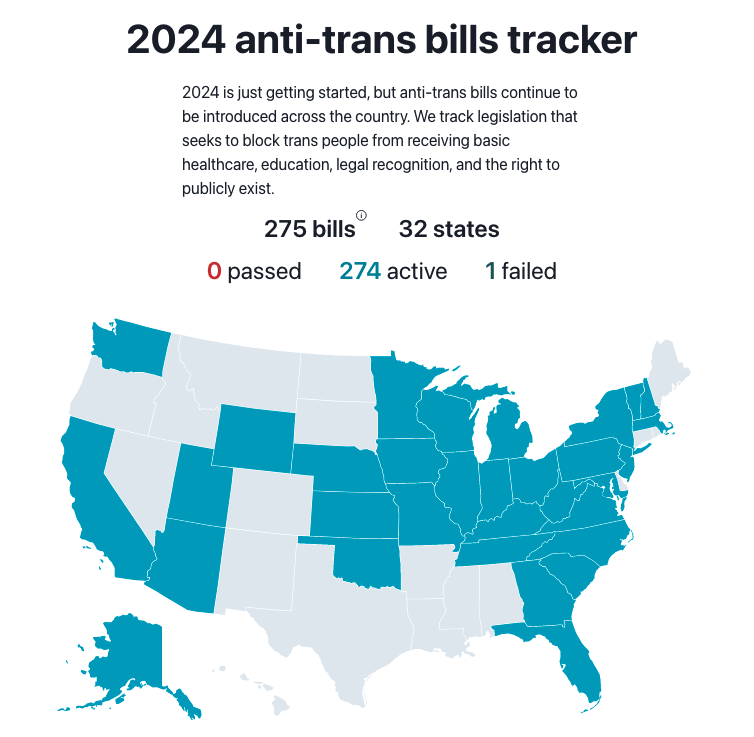2024 is kicking off with… a lot of proposed anti-trans legislation and policies. Aspects of anti-trans sentiment and action can feel very particular to local, regional, or national politics and attitudes. Yet the fact of anti-trans legislation and regulation is a local and global phenomenon, and illustrates the need for and value of truly international approaches in feminist bioethics.
An entirely non-exhaustive roundup of recent news
As the website Trans Legislation Tracker notes “2024 is just getting started, but anti-trans bills continue to be introduced across the country” in the US. That includes a whopping 275 pieces of introduced state legislation across 32 states. There are also 38 proposed national bills.

Another approach to introducing harmful anti-trans measures is through executive action that circumvents legislative processes. An IJFAB blog post from last year details one such approach taken by an Attorney General in Missouri. Recently Ohio’s governor vetoed legislation approved by state legislators only to then issue his own Executive Order regarding gender affirming surgeries and proposing state rules for regulation of gender affirming care (in which medical ethics gets a mention).
The UK has been navigating anti-trans sentiment – with the only dedicated gender clinic shutting down in 2022 and as recently as last month the UK’s minister for women and equalities compared gender-affirming care and conversion therapy. The approach to gender affirming care in minors is generally sourced in a European model often referred to as the “Dutch Protocol.” But scrutiny of this approach is not limited to the US and UK, but is increasingly arising in European nations too.
Amidst all this, the World Health Organization (WHO) is convening an interdisciplinary group of experts next month to develop a “new guideline” to “provide evidence and implementation guidance on health sector interventions aimed at increasing access and utilization of quality and respectful health services by trans and gender diverse people.” As discussed on the blog back in 2018 regarding WHO disease classification and transgender people, such moves can come with benefits and detriments. In this case, the WHO has gathered a broad range of perspectives among their experts – much to the dislike of anti-trans voices who vocalized their disapproval of a trans bioethicist and expert being invited.
An entirely non-exhaustive review of recent bioethics literature
It is a good time to turn to international and feminist approaches to bioethics in response to all this. Florence Ashley has a publication track record on trans law and trans bioethics related topics and a recent essay on “What is it like to have a gender identity?” Theodore Schall and Jacob Moses recently published “Gender Affirming Care for Cisgender People” in the Hastings Center Report. A similar theme emerged in an essay by Lydia Polgreen in the New York Times that challenged the ways in which gender identity and regret are deployed selectively. Each of these texts help trouble assumptions about the very language and themes deployed in so-called “debates” about trans health and ethics.
A PubMed search of new publications that came out last month alone revealed three international essays address trans health and bioethics. From Spain comes “The ethics of nursing care for transgender people” and “Health care for trans people: a bioethical reflection” and from France “Assisted reproductive technology in France: The reproductive rights of LGBT people” detailing how although laws regulating ART in France have expanded to include same-sex female couples, they still typically exclude gay men and trans people from accessing reproductive technology.
If you are writing in this area, or others, consider submitting your work to IJFAB to add to the literature.

